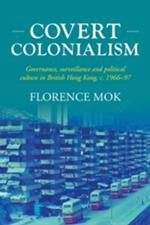This book is the first comprehensive archive-based study to explore governance, surveillance, political culture and public policymaking in colonial Hong Kong from 1966 to 1997, using newly released archival documents in London and Hong Kong. Using historical discipline, it provides a thorough understanding of state-society relations in Hong Kong. This book fills the long-standing void in the existing scholarship by constructing an empirical study of colonial governance and political culture in Hong Kong from 1966 to 1997.Using under-exploited archival and unofficial data in London and Hong Kong, it overcomes the limitations in the existing literature which has been written mainly by political scientists and sociologists, and has been primarily theoretically driven. It addresses a highly contested and timely agenda, one in which colonial historians have made major interventions: the nature of colonial governance and autonomy of the colonial polity. This book focusing on colonialism and the Chinese society in Hong Kong in a pivotal period will generate meaningful discussions and heated debates on comparisons between ‘colonialism’ in different space and time: between Hong Kong and other former British colonies; and between colonial and post-colonial Hong Kong.

Covert colonialism : governance, surveillance and political culture in British Hong Kong, c. 1966-97
ISBN: 9781526182333
Format: Paperback
Publisher: Manchester University Press (ADS)
Origin: GB
Release Date: January, 2025


